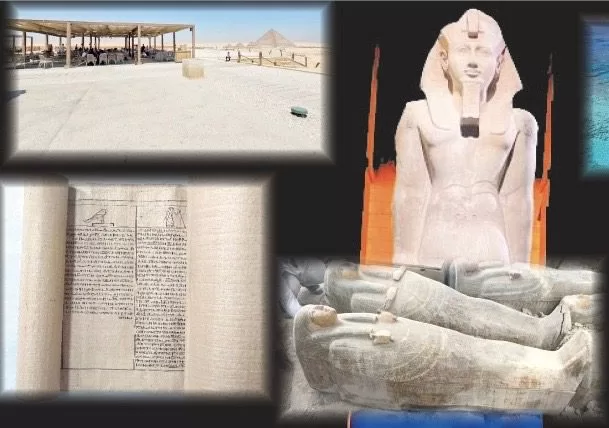The Egyptian tourism and antiquities sector made significant successes in the past ten years, ones that appear to have gotten their steam from the spirit of the June 30 revolution.
The same successes were fuelled by Egypt’s desire to foster the growth of its tourism sector, particularly through the implementation of the National Strategy for Sustainable Tourism 2030.
With a target of attracting 30 million tourists by 2028 and an annual growth goal ranging between 25% and 30%, the strategy is poised to make a substantial impact.
The first quarter of the current year witnessed a 4% increase in tourist arrivals, compared to the same period in 2023, which itself was a record-breaking year for Egyptian tourism.
Despite facing a range of challenges, Egypt achieved unprecedented inbound tourism figures in 2023, welcoming 14.906 million visitors, surpassing the previous record set in 2010.
In addition to the influx of tourists, Egypt has also made significant strides in expanding its hotel room capacity in the first quarter of 2024.
The introduction and operation of these new accommodations do not only provide expanded lodging options for tourists, but also generate numerous direct and indirect employment opportunities for the nation’s youth.
Looking ahead, there are plans to open and operate an additional 25,000 hotel rooms by the end of 2024, further underlining Egypt’s commitment to sustainable tourism growth and the broader economic benefits it brings.
Egypt’s popularity is surging, with Google searches reaching new heights, according to the world leading travel news site, Travel off Path.
Forecasts indicate that 2024 will bring unprecedented levels of tourism to the country, the site says.
The American company, Tripadvisor, recently ranked Hurghada, on the Egyptian Red Sea coast, as the third best nature destination in the world for 2024.
This prestigious honour is part of TripAdvisor’sTravellers’ Choice Awards, bestowed upon destinations that consistently receive exceptional reviews and feedback over a 12-month period from the Tripadvisor community.
In recent international news, Egypt has garnered attention for its significant archaeological findings.
Particularly, an Egyptian expedition led by leading Egyptologist, Mostafa Waziry, has uncovered four intact papyri in 2023: Waziry 1,2,3 and 4.
This discovery represents the first instance of Egyptians discovering complete papyri in about 120 years.
In 2021, prominent archaeologist, Zahi Hawass, and his Egyptian team made a momentous find in Luxor – a 3500-year-old city named ‘The Rise of Aten’, dating back to the reign of Amenhotep III.
This is the largest ancient city ever uncovered in Egypt, one that has significantly enriched the country’s historical narrative.
The Ministry of Tourism and Antiquities is dedicated to enhancing the operational framework at archaeological sites and museums and has a strong focus on digitalisation.
Through collaboration with numerous countries across the globe, efforts extend to restoration, hosting international conferences, joint excavation missions, and organising temporary exhibitions overseas.
These endeavours have led to significant financial reform and substantial revenue growth for the Supreme Council of Antiquities (SCA), with a fivefold increase in revenue achieved in the fiscal year 2023/2024,compared to 2021/2022.
This transformation has reduced the SCA’s reliance on the state’s general budget from two-thirds of its expenditure to zero.
One of the international exhibitions, ‘Ramses and the Gold of the Pharaohs’, wrapped up its run at the Australian Museum in Sydney last May, following its remarkable success since its debut on November 17, 2023.
Featuring 182 artefacts, the exhibition’s highlight is the coffin of King Ramses II.
The journey of this exhibition included previous stops in Houston in November 2021, San Francisco in August 2022, and Paris in April 2023, with the upcoming fifth stop planned for the city of Cologne, Germany, in July to welcome visitors from different parts of Europe.
Temporary foreign exhibitions play a crucial role in promoting Egypt as a cultural tourism destination.
The Ministry of Tourism and Antiquities will co-organize the ‘Top of the Pyramid: Ancient Egyptian Civilisation’ exhibition in Shanghai, China, from July 19 to August 17, 2025, showcasing artefacts to be displayed in Asia, for the first time.
Investment in services for archaeological and heritage sites is on the rise nationwide, as the private sector joins forces to enhance the tourist experience and boost revenue.
The Grand Egyptian Museum (GEM), set to open this year, has achieved the prestigious EDGE Advanced Green Building Certification, distinguishing it as the first museum in Africa and the Middle East, and one of few globally, to receive this accolade.
This certification acknowledges the GEM’s resource-efficient and climate-smart design and construction, resulting in over 60% energy cost savings and a 34% reduction in water usage, compared to conventional buildings of similar size and type.
In the past ten years, several ancient sites also underwent archaeological restorations and are now open to the public, including the Babylon Fortress, the Ben Ezra Synagogue, Ramla and Haddad Towers of the Citadel of Saladin, Al-Hakim and Al-Aqmar Mosques in Al-Muezz Street, the first Ottoman mosque in Egypt,Suleiman al-Khadem mosque, and the Imhotep Museum in Saqqara.
The SCA is implementing a plan to convert museums and archaeological sites in Egypt into environmentally-friendly and sustainable locations.
This includes the installation of solar power stations at the Mohamed Ali Palace in the southern Cairo district of el-Manial, the Visitors’ Centre in the Giza Pyramids area, the Royal Jewellery Museum, and the Alexandria National Museum.
Moreover, an electronic ticketing system has been implemented to replace paper tickets, along with a new payment system that accepts various bank cards for purchasing tickets to visit a number of archaeological sites and museums.






Discussion about this post